|
Answer each question with the first word or sentence that comes to you as a way of stirring up some of the memories of your own life.
0 Comments
A sympathetic character in a bad situation
A quest to discover fame, fortune, or love Seeking to solve a mystery Learning to work hard for something that once came easily Making a seemingly simple decision that winds up changing one's life entirely A warning from an unusual source A deathbed promise An accident, event, or miraculous factor that causes a personality change A child searching for a lost parent (or vice versa) The redemption of an unpleasant character A mysterious power that can cause either fortune or misfortune The surprising intervention of fate or magic to resolve a problem The reconciliation of enemies The consequences of intractable behavior The loss and recovery of a valuable object The restitution of a character's deserved state of being A sense that the fates or some greater supernatural force is directing your life Waiting to be rescued Emotion Reigns
How passionate storytelling makes a message unforgettable. BY KELLY SWANSON I was speaking to a group of hotel managers in a program on how to motivate their employees to provide better customer service. In the opening, I pointed out that according to a 2016 Gallup poll, only 34.1 percent of American workers are engaged in the workplace. And then I told them a story. It was about a woman I had heard singing as she worked in a hospital, and how I had heard her voice all the way from the parking lot. "Some sweet morning, when this day is over, I'll fly away." They were loud, staccato, jubilant notes of a life well lived. When the automatic glass doors to the building opened, I could see her standing there holding her mop as if it were a beloved dance partner, as if her faded cotton dress were made of the finest silk. I watched her all throughout the day as she touched the lives of many. In the cold antiseptic corners of that hospital I saw pain find healing, watched sorrow meet comfort, and saw hopelessness find hope all wrapped up in a faded cotton dress and comfortable shoes. That day, a woman full of blessings who smelled of bleach showed me what service looks like—and it didn't come in a list, but in an attitude. The program continued on, and at the end I asked my audi ence who among them could remember what I had mentioned earlier about the poll and the percentage of employees it indicated were engaged in the workplace. Two hands went up. Then I asked if anyone could remember the song the woman in my story was singing. Almost every hand went up. Nobody could remember the fact, but everyone remembered the story. That showed me how facts aren't tied to emotions—but story is. It is the greatest tool we have to connect and engage. Are all stories equal? No. I've watched speakers tell stories that captivated the entire room, and I watched them tell stories that put everybody to sleep. Just having a story is not good enough. Apply the following tips to your stories and watch what happens. Understand how and why story works Once you understand the psychology behind stories and their impact, it gets easier to write the ones that are most effective for you. It starts with an understanding that listeners don't take action without first having a visual. Therefore, their thoughts are not stored as words, but as images. For your data to have a lasting impact, it must be wrapped in an image for the listener to truly connect with, store and access later. The story does all the work. The point drives it home. Story trumps data. Stop looking for a good story So many speakers ask, "Is this a good story?" That's the wrong question. Don't go looking for a "good" story. Look for one that your audience will connect with. An experience they can relate to. Then work on making it a good story Meridith Elliott Powell is a professional business speaker who uses stories as part of her presentations. "Stories are more powerful when you are not always the hero in the story," she says. "Your audiences learn so much more when they can relate to you. So when you are vulnerable in the story—when you are the one learning rather than teaching the lesson—it has far more impact." Look for stories that make a connection and make them good. Craft a good script and a good delivery Every story has two major components—a stellar script and an awesome delivery. You can't have one without the other. Every word makes a difference with its ability to add power or take it away, Every gesture, pause, voice inflection and expression has that same power. Use it. Don't wing it. Don't step outside of your story and simply talk about it. Stand inside of it and live it again. Include emotions When listeners connect with your story, they aren't connecting with the facts from your life. They are connecting to how you felt along the way. They may not share your experience of moving to a new country, and therefore can't relate to it. But if you say you were sad to leave your family, that you felt alone, that you felt invisible, that you weren't sure what to do, people can relate to those emotions. The emotions are your experience, and the bridge that helps listeners step into your story and connect with your journey. Don't just tell what happened, speak about how it made you feel. Show; don't tell A story is as powerful as its details. These details paint the scene and the characters. The details you share (the character descriptions, accents, sounds and smells) allow the listener to step into your story instead of just hearing about it. If the listener can't see the scene, they can't connect with it. They want specifics, not generalizations. Don't speak about how hard it was for you in the 80s. Talk about a specific moment in time when something happened. Less is more Telling a story in five to seven minutes is a challenging task and worth the labor, because it forces you to choose the words that count. Like songs, our stories should be tight—every word chosen should serve a purpose—every word should audition its way in. Treat every word like it's a note in your song. Act it out The most common mistake speakers make is that they tell the story like they are reading a grocery list. Don't step outside of your story and simply talk about it. Stand inside of it and live it again. Act it out whenever you can. Don't plan gestures to match your story, just be expressive when you tell it. We do this naturally when we tell stories to our friends and family. It's when we get onstage that we become stiff and unnatural. Tell a story in the same comfortable manner you would have if you were sitting at the kitchen table (without the ums and uhs). Relive the story as you tell it. D KELLY SWANSON is an award-winning storyteller, comedian, motivational speaker and author. She teaches the art of connection and engagement through the power of story. Visit www.StoryCraftingCamp.com. Master the art of connection and engagement through the power of story You. Your story. Make an impact. Music for the evening was performed by the Now & Then Trio.
Tellers: Stuart Whittmore - told the story of his life from "doing it his way" and getting a high paying job without a college degree. From there, when the economy tilted, he took a nosedive into alcoholism and depression. One day, seeking refuge, he went into the forest to end his life with a gun. At the moment he pulled the trigger he asked God for forgiveness. He pretty much shot his face off but he lived. And because he lived, his life changed. The reconstruction of his face too a long time and many surgeries. during that time he healed mentally as well. Now he travels around telling people his story so that he can help others who reach "the bottom". He brings a wonderful message of hope. Sherry Leonard - talked about not really knowing her father. As an adult she learned that she had other siblings because her father had been married twice before he married her mother. He became her father at the age of 40. Linda Bradley - Linda's story was about surviving leadership. Her job at Alpha Beta market years ago was to help the head of their travel agency. They were planning a ten week cruise on a first class liner. At the last minute, right before the cruise was to sail, Linda's boss broke her leg forcing Linda to go on the cruise in her place. The story is about how Linda, a single mom, got the help of her parents to watch her daughter and not only survived the trip, but thrived in the knowledge that she "did it!" and did it well. Summer Ashley - Summer was an Rotary exchange student in Japan and her story is about her experiences there. She felt like an alien for a long time - not being able to break through the cultural differences. However, by using humor (and applying whipped cream mustaches and eyebrows to her family) she gained their trust. She wants to apply for college in Japan and continue her journey. Ryan Hess - told the story about being on the Bold and the Beautiful soap opera. The set was next to The Price Is Right and the "wheel" (which is one of televisions "sacred cows") was wheeled into his range. The temptation of spinning the wheel was too great and Ryan just had to do it. While the wheel was spinning he was called to the set and he never found out what he "won." To this day it puzzles him. Diana Coogle - Her story was about becoming Rebecca Dougl, the second coming of Christ - her journey through schizophrenia. Diana ended up on the streets of San Francisco at the age of 27, portraying the life of a 14 year old teenaged girl named Rebecca. She landed in a mental hospital in Napa and remained there until gradually drugs and group therapy helped her come back to who she really is. All of the stories were stunning.  In honor of Martin Luther King day we chose the topic of Diversity. Our tellers this evening were: Androsh Maros: He was born during the time of bombs in Budapest. His story is of his coming of age and coming to the United States where he experienced a new element of diversity in New Jersey. Kathy Logan: Kathy was brought up in a Greek family and told stories about her Greek Grandfather. Hers was a rich past with the many facets of an ethnic family. Sylvia McKinley: Sylvia's story was about being a woman in a man's world. She was one of the first uniformed guards in the California prison system. Her experiences highlight the varying trust levels the men felt having her with them. Rebecca Bender: Rebecca is a survivor of sex trafficking. She does not fit the normally thought of profile. Her story was riveting and scary. Definitely a wake up call for us all. Mary Edwards: Mary started going blind in high school. It didn't stop her. She has run marathons, rides horses, skis, and even para glides. She speaks of being different - but not really! Ray Dinkins: Ray came from a aggressively bigoted family from the deep south. When he and his wife adopted a child from Ethiopia, Ray's father came to visit. When he went back to the South his friends and family asked what it was like to have a black grandchild. Ray's father replied, "Well, she didn't seem to mind that I am white - so I guess I don't mind that she is black." Not many dry eyes in the room that night. Musicians: included the Rogue Choir (about 30 members strong) and Wacky Dog - an eclectic and fun group who had us all howling (literally) with their song. 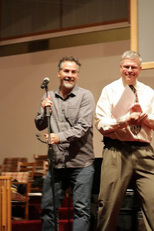 Our first HEARTH was held in October, 2015. Our tellers included: Anna Elkins who spoke about being a single woman in Paris. She met up with a gypsy who sold her a "gold" ring. The ring made her re-evaluate her life and where she would go in the future. Her visual images of the bridges with locks in Paris were stunning. Ferron Mayberry spoke about his best friend. Someone he mined gold with in Oregon. His treasure was his friends ashes. Not gold, not silver, not any material wealth - but the ashes of a "mate" who he had spent so much time with. Dawn Welch told the story of her advancement into the male world of competitive running. Her story revolved around a trophy that she won at a race around Crater Lake. Her treasured object was a tin cup with a marketing slogan from a local hardware store. Linda Hugle's treasured object was a CD of her mother's voice. She told about time spent with her mother when she was old enough to engage with her highly intelligent mom, only to have her Mother die shortly after that teenage year. Robert Trotttmann is a master embroiderer and brought some of his finery to share. His style of embroidery is unique and rare. Not only because some of the threads are gold and silver but because the intricate work is priceless. Rick Terwilliger's story was about a trip to India to visit an asram and the experience he had sharing a bit of bread with others in the room. The bread was given to him by the leader and holy man. His memory included feeding a crowd with a tiny bit of food. Our musicians included Kevin Widdison - leading the evening with Woody Guthrie's "This Land Is Your Land". Next we heard Gordon Schmeider who plays a singing saw. After intermission we heard from a 12 year old guitar player, Austin Schindler accompanied by his mother Kelley. Austin learned to play from his grandfather so all of his songs are from the 60s because that's all grandpa knows. At the end, Kevin Widdison led us all in rousing choruses of "Good Night Irene." We were able to donate over $800 to our non-profit beneficiary - The Josephine Community Libraries. It was an evening remembered by all. A good first start to a wonderful series of events. |
Archives
August 2016
Categories |

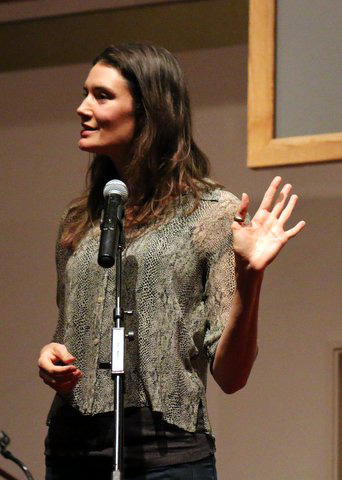
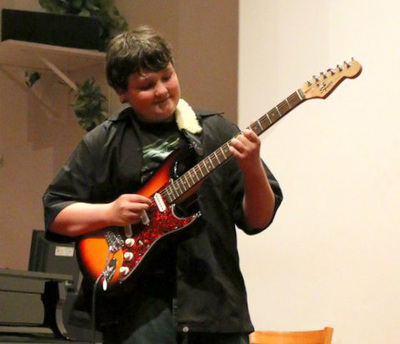
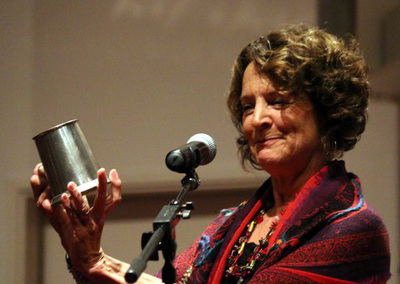
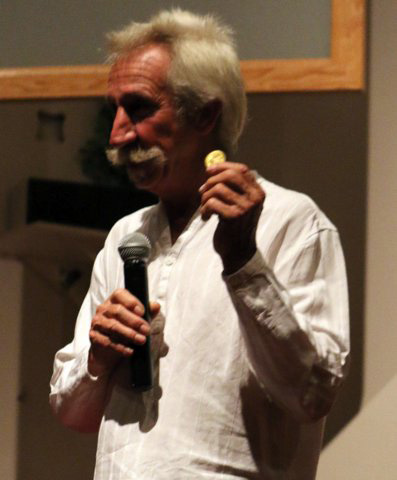
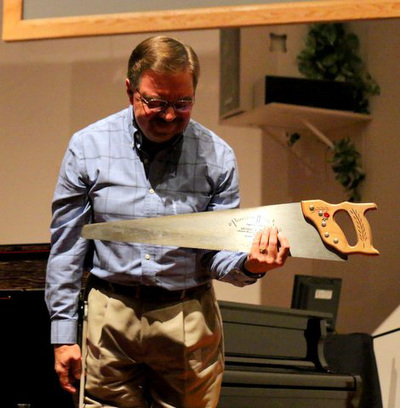
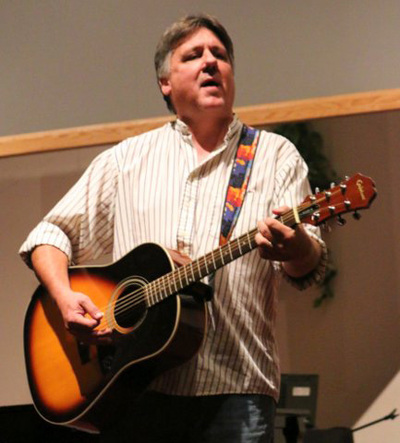

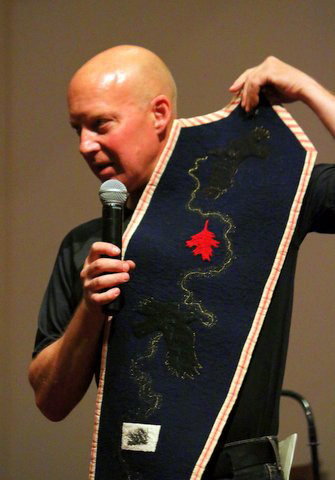
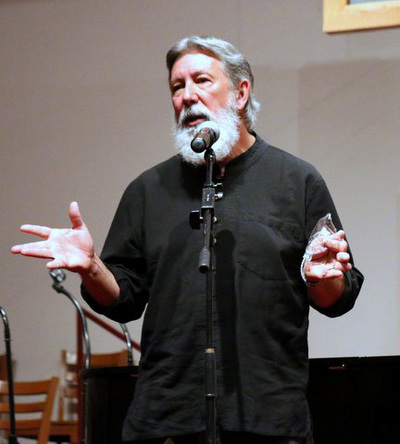

 RSS Feed
RSS Feed
